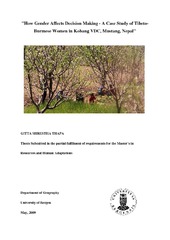"How Gender Affects Decision Making - A Case Study of Tibeto- Burmese Women in Kobang VDC, Mustang, Nepal"
Master thesis
Permanent lenke
https://hdl.handle.net/1956/3304Utgivelsesdato
2009Metadata
Vis full innførselSamlinger
- Department of Geography [634]
Sammendrag
It is commonly presented in scientific literature that Tibeto-BurmeseMountain women’sstatus is higher than Indo-AryanTerai women. Findings of many studies indicates thatTibeto-Burmese women are traditionally afforded more freedom of movement, independentdecision-making, wield considerable power and authority. Therefore, this study is based onthe assumption that if it is the case then women of Tibeto-Burmese group are activelyinvolved in the decision making process both at household and communal level institutions.Focussed on Thakali women of Kobang VDC, the study explores their participation in thedecision making institutions.Using feminist methodology of explanation through everyday experiences of women’s life, anattempt has been made to present the local perception and the rate of participation of womenwhich is affected by social construction of gender. It is found that despite the wielding ofrelative power and freedom, women in Kobang VDC are weighed down by structuralconstrains based on gender and negative ideologies. They are subject to the same levels ofgender inequity as lowland women, and thus, essentialise themselves on how they are tobehave. This attitude, together with numerous other factors, is causing low negotiating poweramong women in the Kobang VDC. The limits on women’s everyday activities are structuredby what society expects women to be. Concretely a main obstacle to decision making is thelimit set by gendered daily working routines.The study emphasizes that moving beyond essentialism is important. It points towardsbringing change in perception to change the structures and ideologies that keep one gendersubordinate of other. It argues that merely bringing women to the decision making leveldoesn’t ensure their active input to the process. Therefore, women should be empowered in aholistic way so that women themselves become conscious to cross the boundary created bysocially constructed gender ideology and negotiate in order to reduce the existing gender gapto make themselves free for participation in decision making level.Key Words: Tibeto-Burmese women, Decision Making, Gender, Social Construction,Feminism, Feminist Methodology.
Utgiver
The University of BergenOpphavsrett
The authorCopyright the author. All rights reserved
